We Don’t Know We Don’t Know
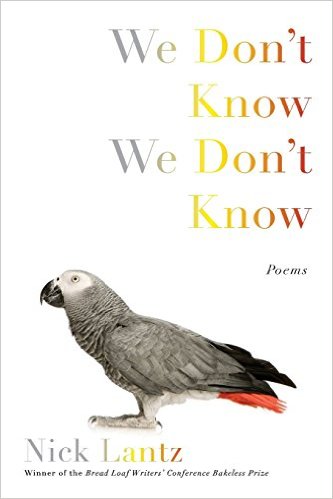
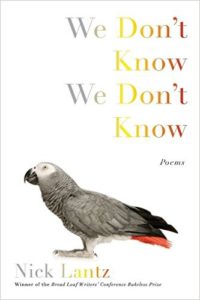 by Nick Lantz,
by Nick Lantz,
Graywolf Press, 2010,
96 pages, paperback, $15.00,
ISBN: 978 -1 – 55597 – 552 – 4
Buy the Book
During the years of Bush the younger, you may remember, verse arose from an unlikely source: Secretary of Defense Donald Rumsfeld, whose evasive rationalizations for the war in Iraq were ironically, angrily circulated as “poetry.” Most infamous was his breakdown of intelligence into three categories: Known knowns, or what we know we know; known unknowns, the things we know we don’t know; and finally, the key to his defense: unknown unknowns — the ones we don’t know we don’t know.
The thing is, from a general ontological standpoint, the man’s right: There are limits to our understanding, so much so that we aren’t even aware we aren’t aware. The outrage of Rumsfeld’s formulation was that he used it to brazenly conceal the truth, rather than illuminate it — used it, you might say, in service to the dark side instead of the light. His notorious quote is one of two epigraphs that preface a fine first book by Nick Lantz, We Don’t Know We Don’t Know, winner of the 2009 Bakeless Prize.
In deeply empathetic poems, Lantz mulls on the confusion, chaos and fallacy that are so often mankind’s lot, and tries to raise them toward the light. In unlikely juxtapositions, he poses the hubris of Rumsfeld against the humility of, of all people, Pliny the Elder, ancient Roman author of Natural History and the source of this book’s other headlining observation, that man knoweth nothing unlesse he be taught. But we can learn our way against the darkness, Lantz thinks. Clear of voice and generous in spirit, We Don’t Know We Don’t Know is a volume both clever and very wise, its title at once riddle, lament, and mantra.
Lantz begins with a chapter of “Known Knowns.” In “Ancient Theories,” he lists “knowledge” dubious or disproved: Aristotle’s theory that frogs / formed from mud; the author’s childhood belief that the world spoke / in code through flashing streetlights. In “List of Things We Know,” he details arbitrary and questionable factoids (Kindness / is correlated / to detached / earlobes) and vertiginous exceptions to rules: Unlike most substances, water expands when frozen, and for this reason / . . . we can / go on living.
But beneath the bewildering fortuities, absurdities, and errors, there burns our persistent urge to understand and explain ourselves — to enlighten — and Lantz treats this desperate instinct lovingly, even as it falls short or fails again and again.
The failures are often ominous. The chapter “Known Unknowns” consists of one long poem called “Will There Be More Than One ‘Questioner’?” — a quote Lantz cites from the 1983 CIA Human Resource Exploitation Training Manual. What follows is a series of obsessive questions directed to an interrogator. Some questions are mundane (Have provisions been made for refreshments?), some are horrific (Will you have an unconscious man dragged past the open door at a pre – determined time?), and some hint at an involuntary intimacy (Will you think of him while you eat dark honey smeared on dark bread in a cafe?).
Haunting the “questioner” are the “known unknowns” of fear, dread, and uncertainty about how he will act and respond, how his prisoner will respond and act, and what will come of their humanity. Ironically, much in those unknowns — Will you risk everything to say [to the prisoner’s wife], He is alive, he is alive? / Will it be true? — is actually within the questioner’s power to decide.
Our very systems of knowing and expressing are inadequate in the chapter “Unknown Unknowns.” Language is insufficient: In “[ ],” Eve laments the birth of words and metaphors, how Adam pointed like a retarded child to name creatures and things. They grow smaller, Lantz writes, each time / she repeats their names. Truth is precarious, an ironic hazard: A verbal tic makes his aging mother preface her lies with in fact, which her parrot repeats over and over as infect.
But we also might know more than we know. To Rumsfeld’s three categories, Lantz adds a fourth: Unknown Knowns. There’s some redemption here, despite so much pathos and futility, as when in “The Sad Truth About Rilke’s Poems,” Lantz assures us that [i]n translation / something / of beauty always dies, but something also is carried over. In this poem, a purer appreciation of that something might call for a simple shift in awareness:
Too many
people close
their eyes to listen to your singing, as if it was the light
of the fire that burns
and not the heat at the heart of it.
The final, promising irony is that in exploring the limits of how we grasp that heat, we might, with a little work and grace, know better.
— Megan Grumbling
Poppin’ Johnny: New American Poems
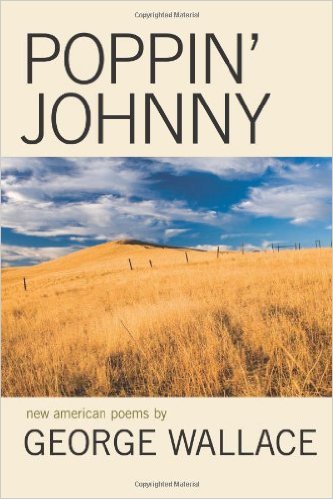
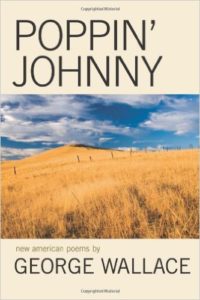 by George Wallace,
by George Wallace,
Three Rooms Press, 2009,
116 pages, paperback, $15.00,
ISBN: 978-0-9840700-2-2
Buy the Book
I’ve often thought of George Wallace as a sort of psychic channeler, so thoroughly does he inhabit the zeitgeist of this age. Fittingly for a poet well – steeped in Walt Whitman, Wallace writes in the voices of multitudes, a sometimes – risky choice, but one Wallace pulls off with credibility and near – perfect pitch. His characters are not caricatures. Though at times broadly drawn, the people who inhabit these poems are accorded respect, even reverence, by a poet whose clear sight is balanced with a deep compassion for the factory worker, the deli clerk, the bartender; for Sally:
waiting for the number eleven downtown which will take
her from that waitress job which even with tips and
kissing ass it doesn’t cover the cost of rent gas groceries
and electric not to mention a babysitter.
Wallace is not and never has been a “political poet” in the naysaying, finger – wagging, sense of the phrase; neither is he a purveyor of the tiresomely introspective, unstructured work incomprehensible to any but the cognoscenti. He is, in the spirit of Whitman, the quintessential populist troubadour; a culturally rich historical context pervades his poems; a seemingly organic understanding of the times, the times of our parents and grandparents.
This poetry flowers forth from the real world, though sometimes the “flowers” are scraps of trash blowing along in the exhaust fumes and gutters of a down – and – out city street. You can almost hear Tom Waits or even Frank Sinatra as a ghostly accompaniment behind these lines:
This is for the guy on nightshift who never knew
a minute of financial peace just a working stiff
sweeping it all up gum sticks candy wrappers
and white plastic knives sweeping it all up in
the rich american night penniless as the day
he was born smoking too many cigarettes.
With his audacious take on American mythology and the overflowing abundance of his painterly imagination, in his poem “That’s You, Man” Wallace re – contexutalizes characters from American popular culture in the jazziest of recitations:
see that kid staring into the midway lights?
see that farm boy hopping off the greyhound? you! you
you you! you are sexy as a stick of dynamite you are
tasty as a ballpark wiener you got plenty of mustard on
you. you are stronger than demolition dust you are
happiest when closed before striking you are horniest
when your lungs fill up with high grade petroleum
Wallace writes a hell of a love poem, too — his work can be dizzyingly erotic:
i loved you once like a fisherman on the edge of
a river, with his fingers to his lips, tasting the
morning air for salmon. i loved you like man
on a horse entering an undisturbed cove. like a
whaler in his scrimshaw dream of hearts and
flowers. like a ship’s mate who catches first
sight of land.
Wallace’s “New World Love Song” echoes the Song of Songs, with a little Pablo Neruda swirled in:
i am breaking bread with the angels
i am walking in the promised
land and o my love she is
a grove of almond trees
she is exotic she
climbs like a
gypsy wagon
Aptly subtitled, these poems are “new” — so fresh, you can smell the rich, complex soil clinging to their roots — American soil, indeed. Highly recommended.
— Nancy A. Henry
Radha Says
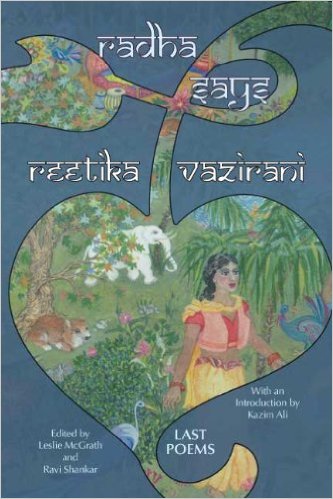
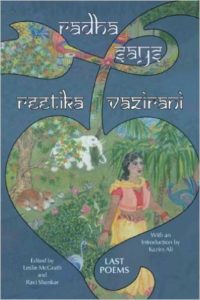 by Reetika Vazirani,
by Reetika Vazirani,
edited by Leslie McGrath and Ravi Shankar,
Drunken Boat Books, 2010,
86 pages, paperback, $14.95,
ISBN -13: 978 – 0 – 578 – 01465 – 4
Buy the Book
These last poems by Reetika Vazirani, written before her death in 2003, are meditations on transience and impermeability. Her language is free; lyrical, playful, bittersweet at times, rich in scholarly references, and with an ability to soar and dive within mere syllables. Now, that’s her language alone. What’s under the surface, the bedrock of her poems, is a different story. Barriers are Saturnian, impossible to navigate without pain. Ancient ghosts and guardians loom over us, the readers. Women can share the fate of their own mothers, often unwillingly, ground down by menial chores and misery caused by a father, lover, or husband. And absolutely no one is a god or goddess on this earth.
This is Vazirani’s warning, even as the poems lilt and sparkle. The contrast between her exquisite language and negotiations with shadows create poetic tensions that are powerful, impossible to forget. It’s what Federico García Lorca called “duende”: an urgent dance on the edge of danger, being gripped by primeval forces. Add to this the way Vazirani speaks of cultural or political barriers, their complex negotiations, and we feel an authentic, hard – earned voice.
The “Radha” of the title — she is the mythical Hindu Radha, beloved consort of Krishna — comes in many guises and personas within this book, alternately vain, ambitious, and ambivalent: a bored guest at banquets, a foil for the fickle and elusive Krishna – like man frequently mentioned, and even, in one poem, Doris Snyder, a hat – check girl on Radha Street. While the poems’ narrators often glimpse divine energies, as in “Nuptials” and “Territory,” they rarely realize wholeness completely. Sharp questioning and fragmentations intrude in “Born,” which concludes the book:
I say god to be wed to the dream
of an avatar what could be worse?
listen it could be if god sent no money
Like an illustrious predecessor — the 16th century poet Mirabai, from Rajasthan — Vazirani alternates praise and complaints within her poems. She is done with worldly vanity, as in the disillusionment of the narrator in “Swamp Green,” and in these lines from “Born”:
forget every bit of floral lace lipstick and any other
buffer between glamour and being done for
And even in the achievement of long – held professional dreams, in a contemporary setting, comes the realization that the world for Vazirani’s poetic narrators can be full of cruelty, envious rivals, and hypocrites. A line from the title poem, “Radha Says,” makes this clear:
the suburban stepinfechit smiles
of realtors laughing at your tribe
Surely for Vazirani, an immigrant who was born in India, this aspect of the American dream was painful to live deal with. Yet using the “stepinfechit” metaphor makes it clear that she knows the lackeys of culture, money, and power to be more insidious than all of us even know. All of us, especially women, can turn lackey, as in the narrator from “Born” who says bluntly that “he’s a god and I’m errands” or in the last two lines of “Ambient:”
mother what you lived I learned
smiling at the list of chores
Reading these poems, however, I became increasingly disturbed by the Radha persona. It is like a mask that cannot be removed, with its crimson and gold paint turned toxic, its scholarly allusions useless in a world of fragmentations and harsh choices. I was reminded, more than once, of Muriel Ruykeyser’s “The Poem as Mask,” with its cry of “No more mythologies!” and how it once entreated poets to reject anything that blocked telling their own real experiences. When Vazirani speaks of the life of a single mother, the details themselves, such as a visit to a public health clinic in “Born,” have true clarity, are authentic and compelling enough without the lure of a myth.
In conclusion, what is Vazirani really saying to us? The same thing Rukeyser told us — No more masks! — but with her own painful truths. May a new generation of poets arise, particularly women poets, who really do not need or choose the old masks in any way whatsoever. That’s still my wish.
— Sharon Olinka
Rain Inside
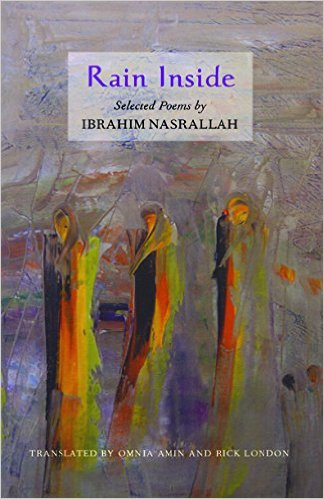
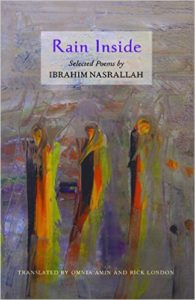 by Ibrahim Nasrallah,
by Ibrahim Nasrallah,
translated by Omnia Amin and Rick London,
Willimantic, CT, Curbstone Press, 2009,
120 pages, paper, $14.95,
ISBN: 978 -1- 93189652 -1
Buy the Book
What little I know of Middle Eastern poetry comes by way of reading translations of Rumi, Hafiz, and Yehuda Amichai, but from the first glance I was drawn into the poems of Ibrahim Nisrallah. “Windows are a first step into the world, / a song on a spacious cloud, / a departure, a rose . . . (3). Suddenly I am in the heart of this poet and those of all the makers with words who reach out and out to understand who they are within.
With a preface by Dr. Omnia Amin that quietly and succinctly gives us a sound base for approaching Nasrallah as a poet and a context for understanding the undercurrent of sorrow that seeps through the poems of a Palestinian man, we step to the window with him. In America it has become common to speak of the poetry of exile as it relates to the distance between our materialistic culture and the country of maker – poets whose voices often go unheard. Through Nisrallah’s poems we understand more clearly what it is to lose home, family, history, and still to yearn for all those things. His poems become a hymn to that desire.
Think for a moment of your first thoughts, stepping into the daylight from your porch. Here is the opening of Ibrahim’s poem, “A Beautiful Morning:”
A beautiful morning
is one that passes and I am not killed.
A city street following the sun at sunset
is obstructed by a roadblock and soldiers.
Another street runs after her
and never returns.
A beautiful morning . . . (44-46).
For all the tension and fear that comes with reading some of these poems, I cannot help but be drawn into the stories of a life that strives to find love and beauty even hanging from the barbed wire. The language is simple, concrete, and purposeful as though taking the step of writing down one more word gives impetus to the hope that he will write another.
This collection was selected by the poet from among a number of his works. Omnia Amin reminds us that his short poems are similar to Japanese Haiku “as they work on awakening philosophical insight by means of an everyday event or insight.” Nisrallah writes a series of poems on chairs:
End
Our ribs break loose like the chairs
from which
we watch the sea at sunset
Isolation embitters the day
A bold grief lies behind our smile
Being with people implies escape
Our legs sink into the dust like chairs
left in a garden after war (62).
This series of poems and others based in concrete things like chairs, hours, tents, and playgrounds anchor themselves in the everyday while evoking deep sorrow or other more complex emotions. It is as though the poet learns himself through the eyes of things. Part of the joy of finding a poet who is new to one’s experience is the way his or her voice reminds of other poets from around the world. Reading Nisrallah, I thought of Francis Ponge and his oranges, Neruda and his Book of Questions, Bachelard’s attics and cellars. Each of these strives to understand who they are in the world while examining the tiniest details of the everyday and using them as the eyepiece of a telescope to bring the work of their hearts into clearer focus.
The medium length poems in this book often speak to his experience as a Palestinian man trying to find a way to bring that life into the world in a way that honors it while exposing those of us who have never known hunger or exile a clearer picture of the experience. The poet himself says, “Writing is our best
opportunity to understand ourselves clearly; therefore, the secret
of writing resides in the fact that we become whole in the act of writing, unlike any other moment in life” (xv).
Ibrahim Nisrallah does not confine himself to writing poetry, but also writes on literature and the arts. He has written ten novels as well as being a photographer and painter. It is easy to find the visual references in his work as well as the communion he holds with human beings everywhere, the need for home family, love, and the freedom to do our work, whatever that is.
The Rain Inside is a wonderful introduction to English – speaking poets of the work of a gifted and sensitive poet. His translators have brought us his work in a caring and evocative way. Understand that this is not a book for the faint of heart, but rather a chance for each of us to explore who we are and how we will live together.
— Michael Macklin


